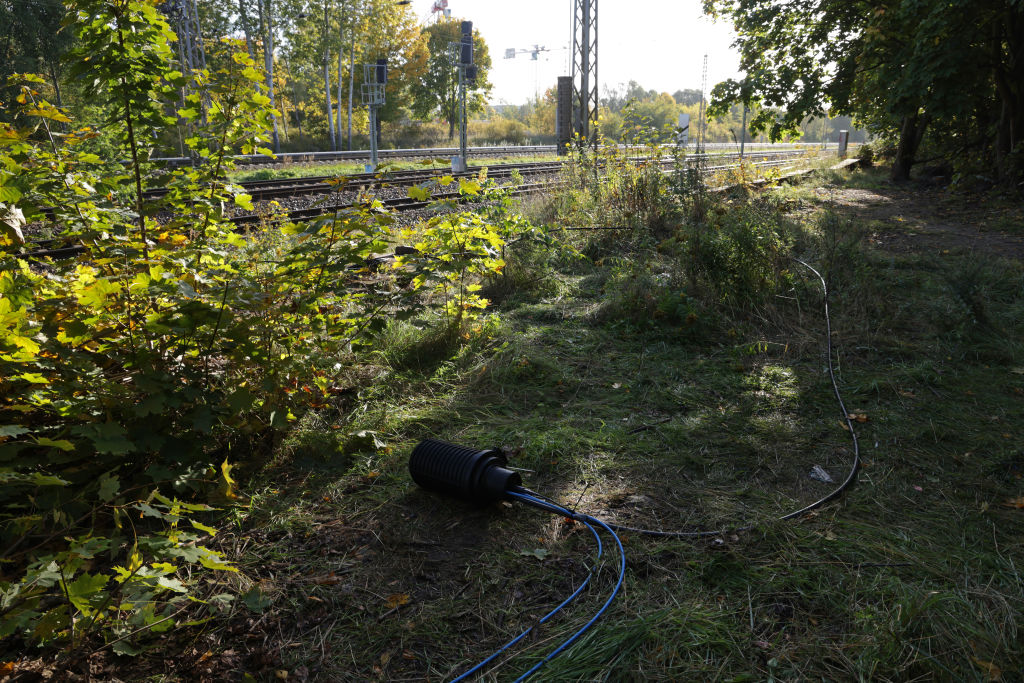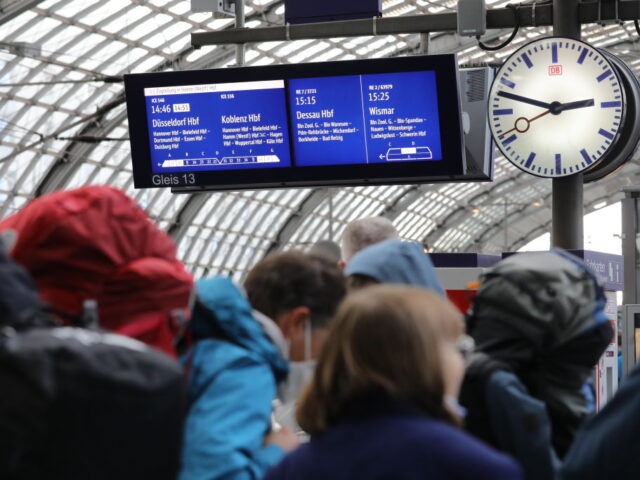Already exacerbated fears about infrastructure sabotage were dramatically underlined at the weekend when two apparently coordinated acts against the backbone system which controls train movements saw Germany’s railway network grind to a halt for several hours. Europe has been suffering such attacks, often attributed to actors of the ultra-left, for many years.
Backhaul communications cables concerned with the Germany Railway (Deutsche Bahn, DB) radio system, safety-critical equipment without which modern, tightly timetabled and high speed trains cannot safely operate, were “willfully and intentionally severed” on Saturday morning by people with “very precise knowledge of the railway’s radio system.” The two cables damaged were 340 miles apart from each other and cut simultaneously.
The impact of the sabotage on the fibre-optic cables was that trains both regional and long-distance were disrupted for several hours over the weekend. While the immediate disruption may be felt to be small, the attack nevertheless has been front-page news in Germany since, given the way in which it seriously underlines the vulnerability of critical national infrastructure. Just weeks before, the Nord Stream and Nord Stream Two undersea gas pipelines were — if reports are to be believes — blown up, severing a major route of importing energy for Germany.
As Die Zeit notes, German general Carsten Breuer warns in the aftermath of the railway cable cutting that much infrastructure — the networks that transmit power and data and underpin modern life not least among them — are extremely vulnerable to attack. He told the German press: “Every substation, every power plant, every pipeline can be attacked, can be a possible target… This is not about an enemy army with soldiers and tanks attacking our country [but] pinpricks in the population that are intended to stir up uncertainty and shake confidence in our state”.

BERLIN, GERMANY – OCTOBER 09: Newly-laid cables lie next to railway tracks at the spot in Hohenschoenhausen district where the day before technicians repaired a section of fibre optic cable that had been severed in an act of sabotage on October 09, 2022 in Berlin, Germany. Unknown assailants purposefully severed GSM-R cables of German state rail carrier Deutsche Bahn critical to communications yesterday in Berlin and Dortmund, leading to a three-hour total disruption of railway service across northern Germany. Police are investigating. (Photo by Sean Gallup/Getty Images)
Given the context of Europe’s present tousling with Russia over their land invasion of Ukraine this year, eyes appeared to have instantly turned to Moscow over the cause of the allegedly sophisticated sabotage of the rail network on Saturday. On Saturday, the German interior minister said the authorities had to “assume intentional acts” were behind the attacks.
The Telegraph reports the comments of senior Green Party MP Anton Hofreiter, who chairs a committee in the German Parliament, who said of the attack: “To pull this off, you have to have very precise knowledge of the railway’s radio system. The question is whether we are dealing with sabotage by foreign powers”, saying it was possible this attack may have been a “warning” to Germany from Moscow.
Yet official blame quickly moved on, with German police saying that while they still suspect a potential political motive for the coordinated strike on the rail network is possible, they did not suspect it was the work of a foreign power or an act of terrorism, Reuters reported.
While little discussed until Russia’s war escalations, major infrastructure sabotage is not unknown in Europe, especially in nations with developed and hardened hard-left organisations who seem to see disrupting power and communications as effective propaganda of the deed.
Far-Left Anarchists Suspected of ‘Terrorist’ Sabotage After Italian Train Chaos https://t.co/HprHlMuyF7
— Breitbart London (@BreitbartLondon) July 23, 2019
Breitbart has reported on many such instances of the hard-left attacking the basic infrastructure which does the heavy lifting for 21st century life, and railways are not an uncommon target. High-speed trains were sabotaged in Italy in 2019 by arson inside a power substation in a case, it was noted, that coincided with the court judgement on another group of left-wing extremists who were being sentenced for their role in a book shop bombing.
Although harder work and considerably more likely to cause loss of life, train derailments by the hard left have also been witnessed in recent years in Canada, with environmentalists protesting an oil pipeline by sabotaging trains carrying oil. In one case, a derailed oil train was engulfed in flames and 1.5 million litres of oil were spilt.
Data infrastructure including telephone exchanges and fibre optical cables, and supply power are also known. In 2019, a radio station and radio transmitter were burnt down in France. In 2020, 50,000 people lost internet access in the greater Paris region after telephone and data cables were cut, the culmination of a weeks-long campaign of such sabotage against information infrastructure. It was suspected the “ultra-left” could have been responsible.
In 2021, a series of apparently connected attacks were directed at telephone and internet services in France, with sabotage on several nights seeing data company work vans burnt out, fibre optic cables destroyed, and a communications tower destroyed. Left-wing actors took credit for the acts, saying in a statement: “it is not to protest against 5G in particular but in a broader context, fighting against the techno-world… We want to salute all the arsonists who are acting in the shadows at the moment and repeatedly beating this technological hell.”
France: Far-Left Antifa Extremists Possible Suspects in Mass Sabotage of Internet Infrastructure https://t.co/ydwvfFowXn
— Breitbart London (@BreitbartLondon) May 8, 2020
There has been more of the same seen this year. In early April, the far-left was suspected in the major sabotage of a power station and nine power lines on two consecutive nights which left thousands of homes and a semiconductor factory without power. Just days later, several French cities were left totally without internet after major data cables in several different locations were cut in the same night. It was said of the timer that the coordinated strike was by “people who know the network”.
As Agence France-Presse notes, the German government is considering whether the hard-left could be responsible for Saturday’s attack.
Whether the new raft of attacks on German infrastructure are the work of Russia or the ultra-left, there is no denying there is a sense of low-key panic in the air among those responsible for delivering these key services now. European news services were full of the story that the Island of Bornholm, the closest point of land to the Nordstream explosions last week, was without power this morning. The Associated Press even reported that the undersea cable that supplied the island with electricity had been “cut”.
It was later claimed the outage was due to a “local fault” and power had been restored.
Foul Play Suspected as Third Train Derails in a Month After Far-Left Call for Sabotage https://t.co/DgeLZc4RXK
— Breitbart London (@BreitbartLondon) February 21, 2020

COMMENTS
Please let us know if you're having issues with commenting.